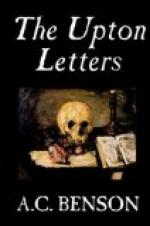Then there is another writer, lately dead, alas, whose books I used to read with absorbing interest, George Gissing. They had, when he treated of his own peculiar stratum, the same quality of hard reality which I value most of all in a work of fiction. The actors were not so much vulgar as underbred; their ambitions and tastes were often deplorable. But one felt that they were real people. The wall of the suburban villa was gently removed, and the life was before your eyes. The moment he strayed from that milieu, the books became fantastic and unreal. But in the last two books, By the Ionian Sea and the Papers of Henry Rycroft, Gissing stepped into a new province, and produced exquisitely beautiful and poetical idealistic literature.
Thomas Hardy is a poetical writer. But his rustic life, dreamy, melancholy, and beautiful as it is, with the wind blowing fragrant out of the heart of the wood, or the rain falling on the down, seems to me to be no more real than the scenes in As You Like It or The Tempest. The figures are actors playing a part. And then there is through his books so strong a note of sex, and people under the influence of passion seem to me to behave in so incomprehensible a way, in a manner so foreign to my own experience, that though I would not deny the truth of the picture, I would say that it is untrue for me, and therefore unmeaning.
I have never fallen under the sway of Rudyard Kipling. Whenever I read his stories I feel myself for the time in the grip of a strong mind, and it becomes a species of intoxication. But I am naturally sober by inclination, and though I can unreservedly admire the strength, the vigour, the splendid imaginativeness of his conceptions, yet the whole note of character is distasteful to me. I don’t like his male men; I should dislike them and be ill at ease with them in real life, and I am ill at ease with them in his books. This is purely a matter of taste; and as to the animal stories, terrifically clever as they are, they appear to me to be no more true to life than Landseer’s pictures of dogs holding a coroner’s inquest or smoking pipes. The only book of his that I re-read is The Light that Failed, for its abundant vitality and tragicalness; but the same temperamental repugnance overcomes me even there.
For pure imagination I should always fly to a book by H. G. Wells. He has that extraordinary power of imagining the impossible, and working it out in a hard literal way which is absolutely convincing. But he is a teller of tales and not a dramatist.
Well, you will be tired of all these fussy appreciations. But what one seems to miss nowadays is the presence of a writer of superlative lucidity and humanity, for whose books one waits with avidity, and orders them beforehand, as soon as they are announced. For one thing, most people seem to me to write too much. The moment a real success is scored, the temptation, no doubt adroitly whispered by publishers, to produce a similar book on similar lines, becomes very strong. Few living writers are above the need for earning money; but even that would not spoil a genius if we had him.




